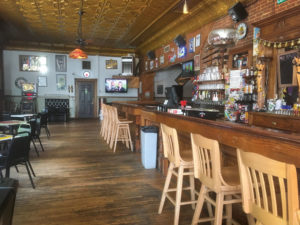By Peter Anderson
The night the fire came over the ridge, I happened to be walking near downtown Salida when I saw a large four-legged shadow in someone’s yard. Big dog, I thought. Only it wasn’t a dog. When it walked under the streetlight in a back alley I said hello to a bear, a hefty bear at that. Maybe the smoke had run it down off the north slope of the mountain. Or maybe it was the strange glow of the flames in a dark sky. I thought about following the bear into the alley, from a distance of course, just to see where it was headed. Then I thought better of it. Later, in the relative security of my friend’s house, I thought about another fire, one that might have gone wild under different circumstances.
For several years, I had been working as a seasonal ranger in the High Uinta Wilderness. It was trail work mostly – clearing out timber, installing water bars. I liked the high country solitude of it all. Unlike most of my fellow rangers, younger locals from Vernal or Roosevelt for whom firefighting meant a trip “out of Dodge” with good food and overtime pay, I was reluctant to trade wilderness time for a fire crew hitch. Then in the summer of 1995, fire came to me.
I was well into a long day on the river trail that led into my backcountry basecamp, when I came around a bend and smelled smoke. Must be a camp up ahead, I thought. As I came up the hill, what came into view first were the flames – flames that were spreading through the dry-needled duff beneath a canopy of fir and spruce. WTF??!! Holy shit!! Goddam fire must be thirty feet around. Nearby was a ring of rocks from which it had apparently spread. No sign of any campers. What now?
[InContentAdTwo]
Beyond and down a slight hill, much to my good fortune, was the fork of a small creek. Behind me, on the other end of a short lead rope – another stroke of good luck – was a pack burro loaded down with my gear, some groceries, a Pulaski and a shovel, which I immediately put to use. It was hot and it was still. Not even a breeze. Good. And It had been that way for days. Bad. If this thing got out of hand, it would burn fast. There was plenty of downed fuel to feed the flames. It didn’t take more than a few pants-on-fire minutes of shoveling to surround the blaze with a buffer line of duff-less dirt. Fast forward down to the creek, I dumped all my gear and groceries, filled up both panniers with creek water, and rehung them on a sawbuck packsaddle. Much to the discomfort and dismay of my equine partner, those old panniers had been patched more than a few times over the years (not well enough to hold water, however) so they were spouting out streams of snowmelt, adding to this donk’s general sense of misfortune, not to mention her reluctance to return to the creek for a refill. Subsequent trips back and forth from the creek were cartoon rodeos. Nevertheless, we finally got the fire put out.
The next day, I went out looking for the missing campers. Over by Fox Lake, I ran into a few boy scouts from Provo and nonchalantly asked where they’d been camping. River trail. Mmmh-hmmh. Take me to your leader. Turned out he was such a nice guy, so genuine in his remorse, if not shame, I didn’t have the heart to ream him out, much as I had thought I would after the smoke had settled and I’d had a whole night to consider what might have been. I simply laid out the facts. He admitted that he should have checked up on the scouts who had been delegated to extinguish the campfire. I agreed and he apologized with gusto. Later, I admit, I did find some satisfaction in passing along my report to the law enforcement guy on our district who made sure they were fined and justice was duly served, as it was for my equine friend, who enjoyed extra rations of oats back at the home corral.
Peter Anderson recently retired from teaching in order to become a full-time word wrangler. He lives in Crestone.

